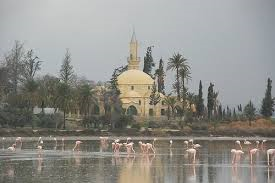Cyprus salt lakes exonerate "Peoples of the Sea" from causing the destruction of Bronze Age civilizations
Drought and decrease in Sea Surface temperatures accompanied the Late Bronze Age collapse

Researchers have discovered a possible clue at the Larnaca Salt Lake that might help explain the demise of the great Eastern Mediterranean civilizations such as Egypt, Greece, Turkey, Syria around 1200BC.
According to an AFP report, a cold, dry spell that lasted hundreds of years may have driven the civilizations to their collapse, French researchers said.
The research suggests that natural factors, including a wintry drought, may have dried up agriculture, caused famine and prompted wars.
The findings, published in the open-access journal PLoS One, are based on an analysis of sediments from the Larnaca Salt Lake.
According to AFP, lead researcher David Kaniewski of the University Paul Sabatier in Toulouse, found evidence of a 300-year drought beginning around 3,200 years ago in pollen grains derived from sediments in the Lake.
“Changes in carbon isotopes and local plant species suggest that the series of four lakes were once a sea harbour at the heart of trade routes in the region, offering a new piece in the puzzle that suggests a history of environmental changes which drove the region into a dark age,” said the report.
“This climate shift caused crop failures, death and famine, which precipitated or hastened socio-economic crises and forced regional human migrations at the end of the Late Bronze Age in the Eastern Mediterranean and southwest Asia.”
Other evidence has been found of a climate shift in sea surface temperatures and a two degree Celsius drop around the same time in the northern hemisphere.
A similar climate event is believed to have happened in medieval times.
“The jury is still out on that one,” said Lee Drake, an adjunct professor at the University of New Mexico whose own research has shown a drop in sea surface temperatures in the Mediterranean coincided with the Greek Dark Ages in the same period.
“If sea surface temperatures drop, then less water evaporates and less water precipitates over land. This period of cooler temperatures seems to be consistent with the Greek Dark Ages of about 400 years,” he told AFP.
“If you can imagine this complex Greek civilization sitting on top of a bucket, then climate came and kicked it out from under them, and there was really nothing that they could have done,” he said.
“You have got cities full of people and now you can only feed half of them.”
Drake said the latest research helped explain the mythology of the Sea Peoples, or raiders who invaded lands in the region.
“We have pieced together from Hittite texts and Egyptian texts an idea of the world that existed then but it was really an entire civilization, a state-run society with kings, vassals, serfs, armies that disappeared leaving very little traces at the end of the Late Bronze Age,” he said.
“It adds a tremendous amount of weight to the argument that what ended these civilizations was climate change.”
Drake said it is still unclear why, if the temperature change was global, the Mediterranean responded so dramatically.
“That is something I think is very important to understand because it is not inconceivable that it could happen again.”
Cyprus Mail, August 15th, 2013
Environmental Roots of the Late Bronze Age Crisis

By David Kaniewski et al.
Go to Plos One article in pdf
Brandon L. Drake: The Influence of climatic change on the Late Bronze Age collapse and the Greek Dark Ages


